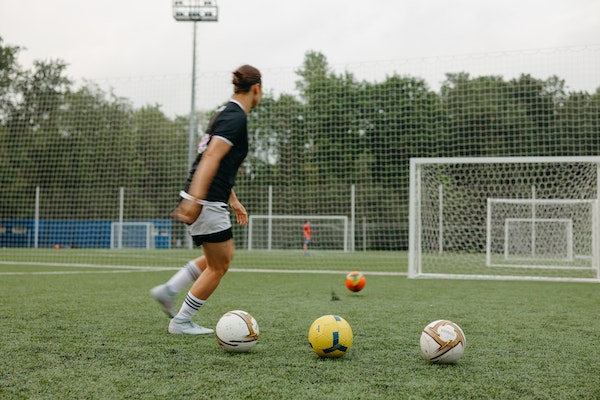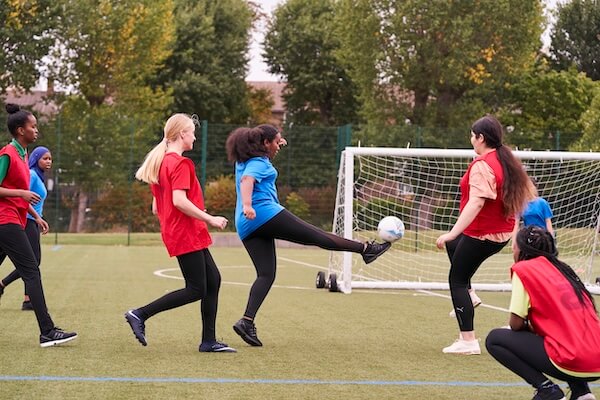
Have you ever been scared to get fit, play a new sport or go to the gym?
If you have, then you are not alone. We all have felt fitness anxiety before.Before I started playing soccer I was terrified. When I joined my team and stood on the soccer field, my heart was racing as adrenaline ran through my veins.
What if I miss the ball?What if I’m too slow?
What if I let my team down?
Trembling with fear, we started playing the game with everyone running to be the first to kick the ball.
I sprinted towards it, eyes laser focused on the ball and then BOOM, I kicked to my teammate. He got it, and dribbled the ball down near the goal posts.
I could feel the excitement in the air as our team sprinted closer to the goal. The ball bounced around people’s feet, going back and forth swinging between players.
Until finally, my teammate with all his energy, gave the ball one solid kick towards the goal posts. The goalie leapt towards it, hands in the air but just missed, as the ball shot straight into the goal. Everyone cheered as he scored.I breathed in as my anxiety melted away. I did it. I played my first soccer game. However, what is fitness anxiety and how can you overcome it?

Brief Explanation of Anxiety and its Impact on Individuals
Anxiety is a natural and common human emotion characterized by feelings of fear, worry, unease, or apprehension. It is a response to perceived threats or stressors, whether they are real or imagined. While mild levels of anxiety can be normal and even helpful in certain situations, excessive or chronic anxiety can have a significant impact on your life. In fact, according to the 2019 research report from the ‘World in Data’ it is the second most common mental illness after depression.

Importance of Addressing Anxiety when Starting New Ventures
Addressing anxiety when starting new ventures like social sports is crucial. Anxiety can hinder your ability to fully engage and enjoy the experience when beginning your fitness journey.
Participating in social sports is meant to be a fun and rewarding activity, but when anxiety goes unaddressed, it can overshadow the positive aspects and create unnecessary stress and discomfort.This can also lead to avoidance behaviors, causing you to miss out on opportunities for personal growth, skill development, and forming meaningful connections with your sports team.
Being able to manage anxiety in the context of new ventures like social sports promotes overall mental well-being. It allows you to cultivate self-confidence and improve your ability to navigate challenging situations. By addressing anxiety, you can fully embrace the joy and benefits that come with engaging in social sports.
The Link Between Anxiety and Starting New Things
Fear of the Unknown and Uncertainty
There is a link between anxiety and starting new things like sport, particularly concerning the fear of the unknown and uncertainty. One study conducted by Barlow and colleagues (2014) found that individuals with higher levels of anxiety tend to have a lower tolerance for uncertainty. They demonstrated a heightened need for predictability and control, which often leads to increased anxiety when faced with unfamiliar situations like trying a new sport.
Perfectionism and the Fear of Failure
Perfectionism and fear of failure also play a role in anxiety when engaging in new fitness activities. A study by Sagar and colleagues (2018) investigated the fear of failure and its impact on anxiety in athletes. The results indicated that athletes who had a heightened fear of failure exhibited higher levels of anxiety when entering new competitive situations. This underscores the significance of perfectionism and the fear of failure in contributing to anxiety when starting new things.
Pressure to Meet High Expectations
You may feel pressure to meet high expectations which can increase your anxiety when entering a new sporting environment. One study conducted by Stoeber and colleagues (2013) explored the relationship between perfectionism and anxiety in various domains, including academic and sports settings. The findings revealed that individuals with high levels of perfectionism, characterized by setting excessively high standards for themselves, often experienced anxiety when faced with new challenges that demand more expectations from them.
While you may feel anxiety about starting new activities whether in sports or fitness, there are strategies to help manage your nerves.

Strategies to Manage Anxiety When Starting New Things
Identify And Challenge Negative Thought Patterns
Strategies to manage anxiety when starting new things involve identifying and challenging negative thought patterns, and one effective approach is utilizing cognitive-behavioral techniques. These techniques involve becoming aware of negative or irrational thoughts and replacing them with more realistic and positive ones. By questioning the validity of anxious thoughts and examining evidence to support or refute them, you can gain a more balanced perspective. They can challenge distorted thinking patterns such as catastrophizing or overgeneralization. Additionally, practicing positive affirmations, mindfulness, and self-compassion can help shift focus away from anxiety-inducing thoughts and promote a more constructive mindset.
Gradual Exposure And Desensitization
Breaking tasks into smaller, manageable steps, allows you to gradually acclimate yourself to new experiences like starting a new sport. By taking incremental actions and gradually increasing the difficulty level, you can build confidence and reduce anxiety. Setting realistic goals and celebrating milestones along the way also provides a sense of accomplishment and motivation. This approach helps you recognize your progress, reinforcing a positive mindset and alleviating anxiety. Through gradual exposure and desensitization, you can overcome your fears and develop the resilience needed to embrace new sports with increased confidence and reduced anxiety.
Utilizing Relaxation Techniques
Utilizing relaxation techniques is another effective strategy to manage anxiety when starting new things. Deep breathing exercises can help you regulate your breathing and activate the body's relaxation response, especially before playing sport. By taking slow, deep breaths and focusing on the present moment, you can reduce stress and anxiety. Meditation and mindfulness practices, such as guided imagery or body scans, promote a calm and centered state of mind. Engaging in physical activities can further release tension and help channel anxious energy. These relaxation techniques provide you with tools to calm your mind, relax your body, and alleviate anxiety when faced with new challenges.
Seeking Support
Building A Support Network
Building a support network is an essential aspect of overcoming fitness anxiety when starting new sports. It encompasses various elements, starting with the invaluable presence of friends, family, and mentors. These individuals provide emotional support, guidance, and a listening ear during times of need. They offer encouragement, share wisdom, and help navigate life's challenges. Additionally, sport groups and communities play a vital role in establishing a robust network. They offer a sense of belonging and connection with like-minded individuals who share similar experiences and struggles you may be experiencing.
Professional Help And Therapy Options
Moreover, seeking professional help and therapy options is a crucial step in addressing mental health concerns if you feel your anxiety is out of control. Cognitive-behavioral therapy (CBT) is a widely recognized and effective therapeutic approach. It focuses on identifying and changing negative thought patterns and behaviors to improve overall well-being. Exposure therapy is another valuable technique often used to treat anxiety disorders and phobias. It involves gradually and safely exposing individuals to their fears to reduce anxiety over time. In severe cases of anxiety, medication options may be considered. Medications prescribed by healthcare professionals can help manage symptoms and provide relief. Consulting with a mental health professional can help determine the most suitable therapy option or combination of approaches tailored to your specific needs.
Embracing New Beginnings With Confidence
Cultivating A Positive Mindset
Embracing new fitness beginnings or trying new sports requires cultivating a positive mindset. One aspect of this is focusing on strengths and past successes. Recognizing and appreciating personal achievements builds self-confidence and optimism for future endeavors. Additionally, embracing the learning process is crucial, especially when playing sports. Instead of fearing failure, viewing new experiences as opportunities for growth and learning allows for a more resilient and proactive approach. Embracing the unknown with curiosity and a willingness to learn fosters personal development and instills confidence in facing new challenges.
Embracing Change And Embracing Uncertainty
Accepting change and uncertainty involves not only viewing challenges as opportunities for growth and practicing resilience but also celebrating achievements and small victories along the way. Recognizing and acknowledging personal milestones and progress is essential for maintaining motivation and a positive mindset when playing sport. By celebrating achievements, you can boost your self-confidence, reinforce belief in your abilities, and find joy in the journey of personal growth. Embracing change and uncertainty requires embracing the small victories as they serve as important stepping stones toward larger goals. Whether it's overcoming a fear, accomplishing a fitness milestone, or making progress in a new sport each achievement deserves recognition and celebration.
Conclusion
Overcoming your fitness anxiety to play new sports will add significant benefits to your life. While it can be scary, as you face challenges like perfectionism and the fear of the unknown, utilizing the above strategies to cope with anxiety will help you get fit and play sports.
It starts with changing your mindset which will lead to actions like putting on your soccer shoes, grabbing your tennis racquet or buying that gym membership.Managing your anxiety is the first step on your fitness journey.
Guest post by Liza Blue






